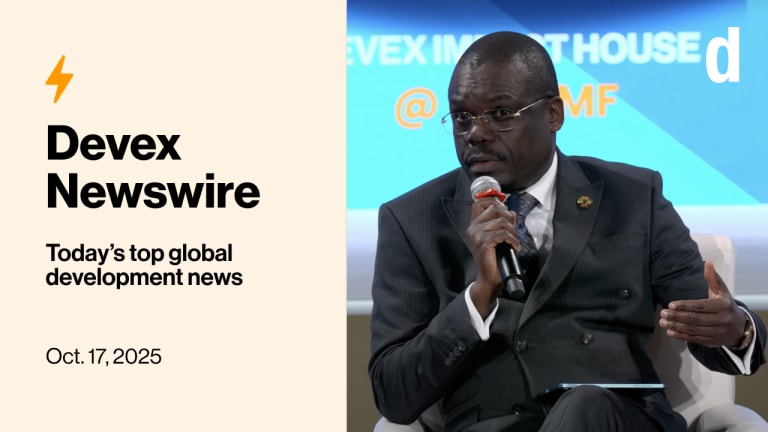
DURBAN, South Africa — With more than half of Africa’s population under the age of 25, many experts believes the continent’s greatest resource and potential competitive advantage could lie in the hands of its youth as they enter the workforce.
However, economic growth on the continent has not yet translated into opportunities for young people to earn a sustainable livelihood — representing both missed potential and a societal risk as they could become alienated and marginalised.
During a discussion titled, “Banking on Youth” at the recent World Economic Forum on Africa, held in Durban, South Africa, experts exchanged ideas on how to make access to finance easier for millions of young Africans, including entrepreneurs. They discussed how financial inclusion for young people needs to focus on more than just opening bank accounts, and look more closely at creating meaningful socio-economic change among Africa’s poorest people via better access to credit and gaining support from financial institutions.
See more related topics:
► A look back at the World Economic Forum on Africa
► 5 lessons for Africa's emergence
► Mobile World Congress highlights importance of connectivity for meeting SDGs
► Rwanda's 'solar smart kiosk' provides digital solutions to rural mobile phone users
According to the World Bank, in 2014 an estimated 34 percent of Africans over the age of 15 had some type of financial account. While this figure is up 10 percent since 2011, sub-Saharan Africa still lags far behind other regions, where roughly half the adult population have bank accounts. To increase participation in the financial system, experts argued that financial institutions must embrace digital technology and educate young people on financial issues.
Obtaining a financial history
For many entrepreneurs and small business owners, access to markets and access to finance are the leading causes of the short lifecycle of small and medium enterprises. Typically, with payments and transactions done using cash, there is no evidence of an entrepreneur’s financial practices or history. But understanding the downside of a cash-only society is one of the first steps to including the bottom of the social pyramid into the formal economy, said Ineke Bussemaker, chief executive officer of the National Microfinance Bank in Tanzania.
“Without history no one can provide you with any credit, so we have to find ways take informal cash into a formal environment,” she said.
The Tanzanian government has found a way to do that by mandating that farmers receive payments for cashew yields to a bank account.
Bussemaker’s team at the Microfinance Bank opened more than 30,000 low-cost bank accounts for smallholder farmers by traveling to different villages and explaining the importance of formal banking. By doing so, farmers have the opportunity to prove what they have earned, while providing increased transparency with buyers who must pay to official accounts. “This gives farmers something that can prove to the bank an amount earned, and next year the bank could provide a small loan for inputs,” Bussemaker explained.
Making things easier for everyone
CEO and managing director of Diamond Bank in Nigeria, Uzoma Dozie, explained the need to create solutions that ensures no one is discouraged from participating in the formal financial system.
At Diamond Bank, for example, information concerning utility payments, even social media information, are used to develop a more inclusive client scorecard. They also have created a “collateral registry” that allows a potential client to register almost anything of value, which allows for quicker, more responsive lending.
“We had to change the way we do our banking to fit it around the people that we want to open bank accounts with us.”
— Uzoma Dozie, CEO and managing director of Diamond Bank“We had to change the way we do our banking to fit it around the people that we want to open bank accounts with us. Our perspective is that we must find solutions that are cost effective and secondly we have to also provide a reason for people who have been excluded from the banking system to include as part of their livelihood,” he said.
There is business at the bottom of the socio-economic pyramid, Dozie explained to WEF Africa attendees. Because many small business owners do not have credit history, he argued that the banking industry must establish more flexible data sets by which to evaluate clients.
Create synergy between telecommunications companies and financial institutions
Mobile technology has spread rapidly across Africa, spearheaded by telecommunications companies and the use of mobile money transfers. Globally, only 2 percent of the adult population use this platform compared to Africa, where the figure hovers around 12 percent. A 2015 report conducted by GSMA, found a staggering 557 million unique mobile subscribers across Africa at year’s end, equivalent to 47 percent of the continent’s population, making Africa the second largest mobile market in the world.
This giant pool of mobile customers represents a vast potential opportunity to leverage more use of digital finance products.
Bussemaker said using an identity check required to purchase a mobile SIM card could enable more people to open relatively low-cost bank accounts. “Using data, technology and digital identity is the way of the future by offering low-cost, easy banking with the crosscheck of the identity with the usage of the mobile phone number,” she explained.
But financial inclusion and boosting young entrepreneurs is also about the broader issue of “enablement,” not just money, argued MTN’s vice-president of digital services and business development, Stephen van Coller.
“Enablement looks at education, data, support, getting involved in ecosystems and being able to actually access corporates,” he argued.
Read more international development news online, and subscribe to The Development Newswire to receive the latest from the world’s leading donors and decision-makers — emailed to you free every business day.








